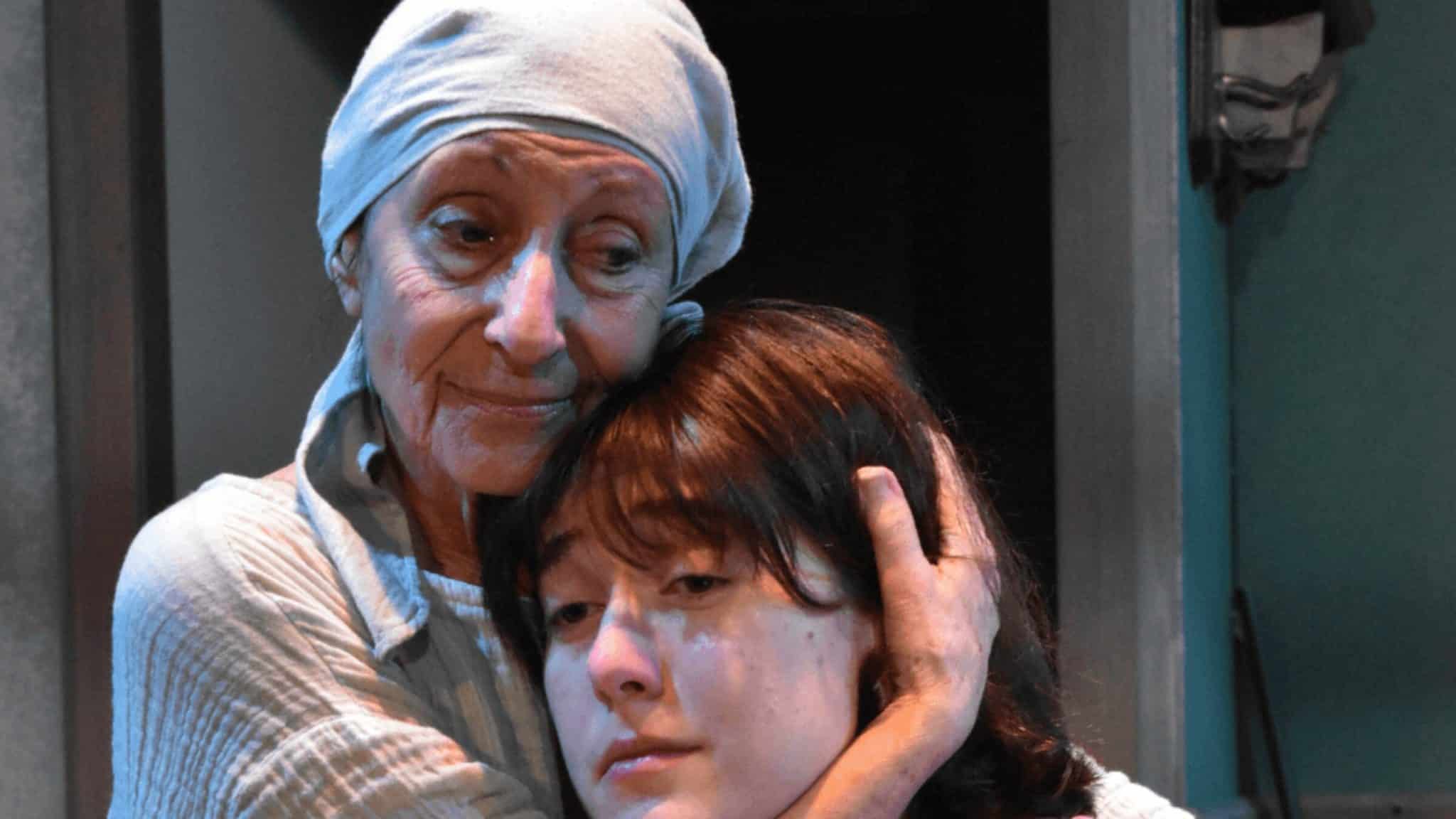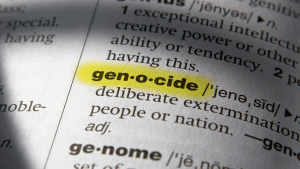Written by Julia M. Klein, originally published in the Forward
Deborah Zoe Laufer packs a suitcase full of themes into her passionate and timely new play, The Last Yiddish Speaker, currently running at Philadelphia’s InterAct Theatre Company.
In just 90 minutes, with only four characters, she artfully etches a dystopian world in which the Jan. 6 attack on the U.S. Capitol has triumphed. The terrifying result is a Christian Nationalist surveillance state that punishes dissent; banishes or kills Jews, gays and other outsiders; and forbids women from attending college or holding professional jobs.
Laufer’s characters — a Jewish father and daughter concealing their identity, the daughter’s unsuspecting boyfriend, and an older woman embodying the richness and trauma of Jewish history — must negotiate these perilous circumstances while somehow remaining true to themselves.
An experienced playwright (End Games, Leveling Up, Informed Consent, The Last Schwartz, among others), Laufer reveals the contours of her menacing future America, and the stakes of opposing its rules, only gradually and with considerable craft.
On Colin McIlvane’s realistic set, depicting a kitchen, living room and porch, 17-year-old Sarah (now known as Mary) and her father, Paul, argue about how to balance their safety with her ambitions. Disconnected from their heritage, they are passing as Christians in a small, rural upstate New York town, where they must accustom themselves to religious and social conformity, Big Brother-level intrusiveness, and firearms. On their walls, they display a portrait of Jesus Christ and two crucifixes — emblems of their disguise.
The year is 2029, and the situation for women is deteriorating. Sarah is smart, feminist, frustrated and desperate for opportunity. Incautious and sick of concealment, she is willing to risk everything in a flight to Canada, still a free country, even if the border is protected by a wall.
INTERVIEW: Robert P. Jones Exposes the Disturbing Links Between Christian Nationalism and White Supremacy
Sarah admits to being “a loose cannon,” and in Kaitlyn Zion’s somewhat over-the-top performance it’s hard, initially, to fully embrace her. “You’re impossible,” her father says, with some justification. “Every day you leave this house I wonder what you’re gonna say that will get us killed.”
Dan Hodge’s terrified Paul, forever on edge, occupies the other end of their seesaw: He is the timid accommodationist, willing to compromise everything to keep his daughter safe — a stance that leads her to insult him as “weak.” He, too, has his reasons, not least the fate of his outspoken wife.
Their survival depends, in part, on her handsome and besotted boyfriend, John (Gabriel Elmore), tasked (in a blatant conflict of interest) with surveilling their home for contraband items and thoughts. A representative of a noxious government, he is nevertheless sweet, sympathetic, and trying to do what he believes is right. Will he truly love Sarah, whom he escorts to both the prom and the gun range, or turn her in? John is the play’s pivot, and Elmore’s subtle, perfectly pitched performance elevates this production.
There is one more complication: the eponymous last Yiddish speaker. Dropped off mysteriously at Sarah and Paul’s doorstep, Aunt Chava (Stephanie Satie) represents the last millennium of Jewish tradition and identity, as well as everyone’s favorite Jewish immigrant relative. Her otherworldliness is signaled by Drew Billiau’s eerie lighting, sound designer Christopher Colucci’s music, and the layers of ethnic dress in which costume designer Katherine Fritz envelops her.
Satie, who played Tevye’s daughter Chava in the original Broadway national tour of Fiddler on the Roof, is haunting as this mysterious figure. Speaking a mix of Yiddish (some of it untranslated) and English, she gives the play much of its humor and poetry. Like Anne Frank, Aunt Chava must be hidden from authorities, putting Sarah and Paul at risk. But she is also a mentor: a purveyor of Yiddish jokes, Jewish prayers, pickles and magically appearing ritual objects.
Mostly written before Oct. 7 and the war in Gaza, The Last Yiddish Speaker is nevertheless very much of the moment. Laufer is attuned to the threat of Christian Nationalism, efforts to undermine democracy, and the judicial and legislative assault on women’s reproductive rights. She is equally passionate about the dangers of political polarization and the challenges of maintaining Jewish identity in a sometimes hostile world.
That is a lot to cram in, a heavy lift. But Rozin’s production mostly navigates the play’s transitions — some of them sudden — with grace, and leaves the audience appropriately shaken and stirred.
A Lucille Lortel Theatre commission and a finalist in the Jewish Plays Project, The Last Yiddish Speaker is receiving a National New Play Network Rolling World Premiere. The first stop is Philadelphia’s InterAct Theatre Company, where it runs through April 21. Productions also are scheduled for Oregon Contemporary Theatre in Eugene, Oregon (Oct. 23-Nov. 10), and Theatre Lab in Boca Raton, Florida (Oct. 23-Nov. 17), where Laufer herself will direct.
Julia M. Klein, the Forward’s contributing book critic, has been a two-time finalist for the National Book Critics Circle’s Nona Balakian Citation for Excellence in Reviewing. Follow her @JuliaMKlein.
This story was originally published in the Forward. Click here to get the Forward’s free email newsletters delivered to your inbox.






